TV Review: FX's "Fargo" wraps up a triumphant, provocative, wildly entertaining series
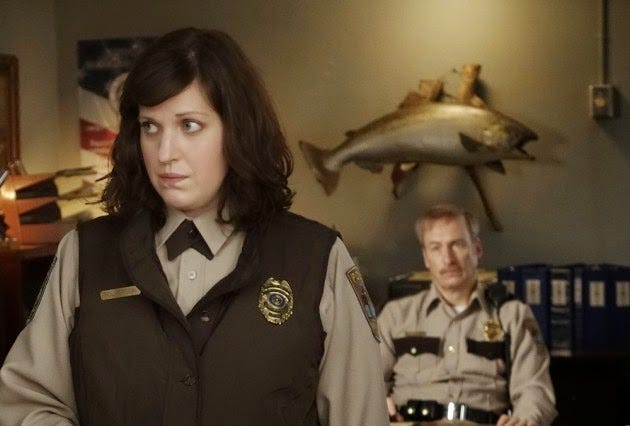
This has been an insanely good year for television so far – between newcomers like True Detective and Review, returning dramas reaching new creative heights like Hannibal and Game of Thrones, a strong creative resurgence from NBC comedies Community and Parks and Recreation, and the eternal greatness of Mad Men, this has already become one of my favorite years of TV viewing in recent memory (and that list doesn’t include several hugely acclaimed titles I have yet to catch up on) – and yet I am quite sure that no show this year has taken me aback quite as strongly as FX’s Fargo.
Nor has any show debuted in 2014 with such immense creative baggage hanging over its head. Joel and Ethan Coen’s Fargo is more than just one of the most acclaimed and beloved films of the 1990s – it is one of the great American movies, one that seems to grow in stature and adoration with each passing year, and while it isn’t necessarily my favorite Coen Brothers film (I love much of their work with roughly equal passion), I think it may well be the clearest, most resounding representation of their voice. And as with any voice so intensely singular, theirs is not an easy one to replicate, especially given how much their style has influenced the modern media landscape (in many ways, I think Breaking Bad owes as much to Fargo the movie as Fargo the TV series does, so deftly does it weave humor, violence, and pathos together against a stark American setting). Suffice it to say, making a Fargo TV series seemed, initially, like the height of folly, a fool’s exercise in living up to an impossible standard.
Yet as soon as Fargo the series arrived, it set its own standard, and if anything, I may find myself preferring the TV show to the movie now that all ten episodes have aired. Writer Noah Hawley has taken the thematic and stylistic core of the Coen Brothers film and dived even deeper, probing the depths of human darkness and heights of human decency to degrees the film certainly pointed towards, but could not reach in 90 minutes. The audacity of Hawley’s Fargo is that it chose to use the Coens’ Fargo as a springboard, the first step towards an even richer and more complex discussion of violence, masculinity, the repression of American Midwest society, and the value of goodness and decency in a world marked by darkness, and the brilliance of the series is that it actually had the intelligence, wit, insight, and dramatic sensibilities necessary to pull it off.
Spoiler-filled thoughts on tonight’s series finale, and the series as a whole, coming up after the jump...
Hawley’s Fargo is filled with great character creations, but the greatest is undoubtedly newcomer Alison Tolman’s Molly Solverson, just as the greatest gift the Coens gave us was Frances McDormand’s Marge Gunderson (that the two feel like wholly distinct yet equally vivid characters is one of the many unbelievable triumphs of the TV series, and owes so much to Tolman’s terrific, confident, utterly compelling performance). She is the protagonist of the series, a hero who manages to remain pure and good from start to finish, but who is so much more interesting and complex than morally upstanding heroes usually get to be.
Hawley’s Fargo spent the early minutes of the pilot introducing familiar elements from the film, but it soon got to work subverting everything we thought we knew, and Molly is part of that. The arc of Fargo the movie is Marge Gunderson coming to comprehend the unfathomable darkness that exists in the world – the world she is about to bring a child into – while Fargo the TV series is about Molly Solverson being forcibly thrust into darkness, starting with the murder of her mentor Vern, and trying to navigate it as best she can. Both are, in essence, Heart of Darkness stories, in which the protagonist takes a journey that leads them to encounter the festering heart of the human condition, and while both women are fully equipped to face it, the difference between the two is that Marge travels down the river at least partially unaware of its destination, while Molly enters with her eyes wide open. What makes both characters extraordinary –in a general sense and relative to the other characters around them – is that they can face the darkness head on, can internalize what they encounter into their worldview without rejecting it or being dragged down, and for Molly in particular, that means she is uniquely capable of going after monsters like Lorne Malvo or Lester Nygaard.
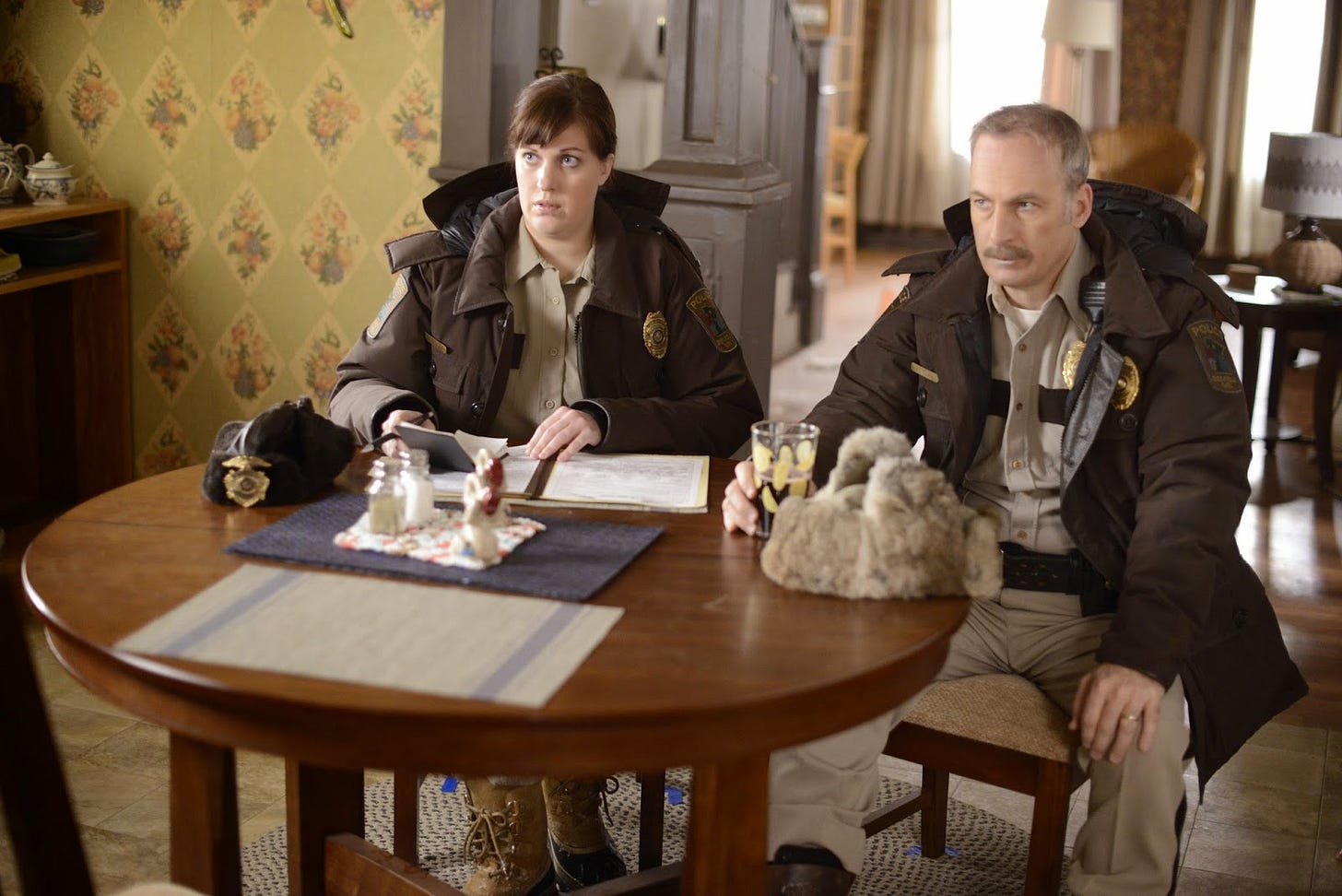
Many viewers found Police Chief Bill’s refusal to take Molly’s investigation seriously as a straining of credulity, but I actually think Bill and his willful ignorance were an essential part of the show’s thematic tapestry, something the finale starkly reflected with Bill’s decision to quit, rather than continue to confront human atrocities (one of many scenes that proved just what an essential presence Bob Odenkirk was to the show). Some people – most, I would wager – simply can’t stand up to the kind of darkness perpetrated in this story, because confronting it means questioning the entire myth of the happy, safe, contented American Midwest. Fargo, both film and television show, is simultaneously a celebration of the decency and community of the American Midwest, and a meditation on the many dark, violent perversions bubbling underneath its surface. Learning to navigate that line is the arc of both stories, but that means there will, inevitably, be characters left on both sides of it. Bill wants to live in the light. Lester chooses to revel in the darkness. Molly manages to straddle the duality, remaining good while she keeps her eyes open towards the dark, and in killing Malvo, her husband Gus chooses to act on one side for the survival of the other.
What separates the series from the movie most for me, though, is the lengths to which it goes to explore what darkness is and how it manifests itself in a modern, familiar setting. The Coens’ film has many disreputable characters, but no single centralized villain, while the action of Hawley’s series is instigated and, in many ways, built around the whims of Lorne Malvo, an antagonist every bit on par with the most vividly wicked characters in the Coens’ own filmography. And as played by Billy Bob Thornton – tremendously, with a haunting, razor sharp restraint – and written by Hawley, Malvo is more than a murderer, or a sociopath, or indeed a straight-up ‘villain.’ He is the Devil incarnate, if not literally than ideologically, a figure of sin and wickedness who commits his worst atrocities not out of spite or anger or greed, but out of a deeply-ingrained curiosity for the nature of the human condition. Just like the Devil of religious texts and myths, Malvo doesn’t necessarily destroy his victims physically (though he does plenty of that with various minor characters), but manipulates them into destroying themselves. I’m still grappling with my exact feelings on the entire Stavros Milos arc, which was far enough detached from the show’s main narrative to feel a tad out of place, but it demonstrated Malvo’s penchant for playing on a person’s insecurities to drive them mad (in this case, using biblical imagery to incite Stavros’ guilt and make him tear his life apart – note that Stavros’ son dies not because Malvo lays a finger on him, but because of where and how Stavros moves him due to his own beliefs and insecurities), while a much longer game was being played with Lester Nygaard and, ultimately, Gus Grimly.
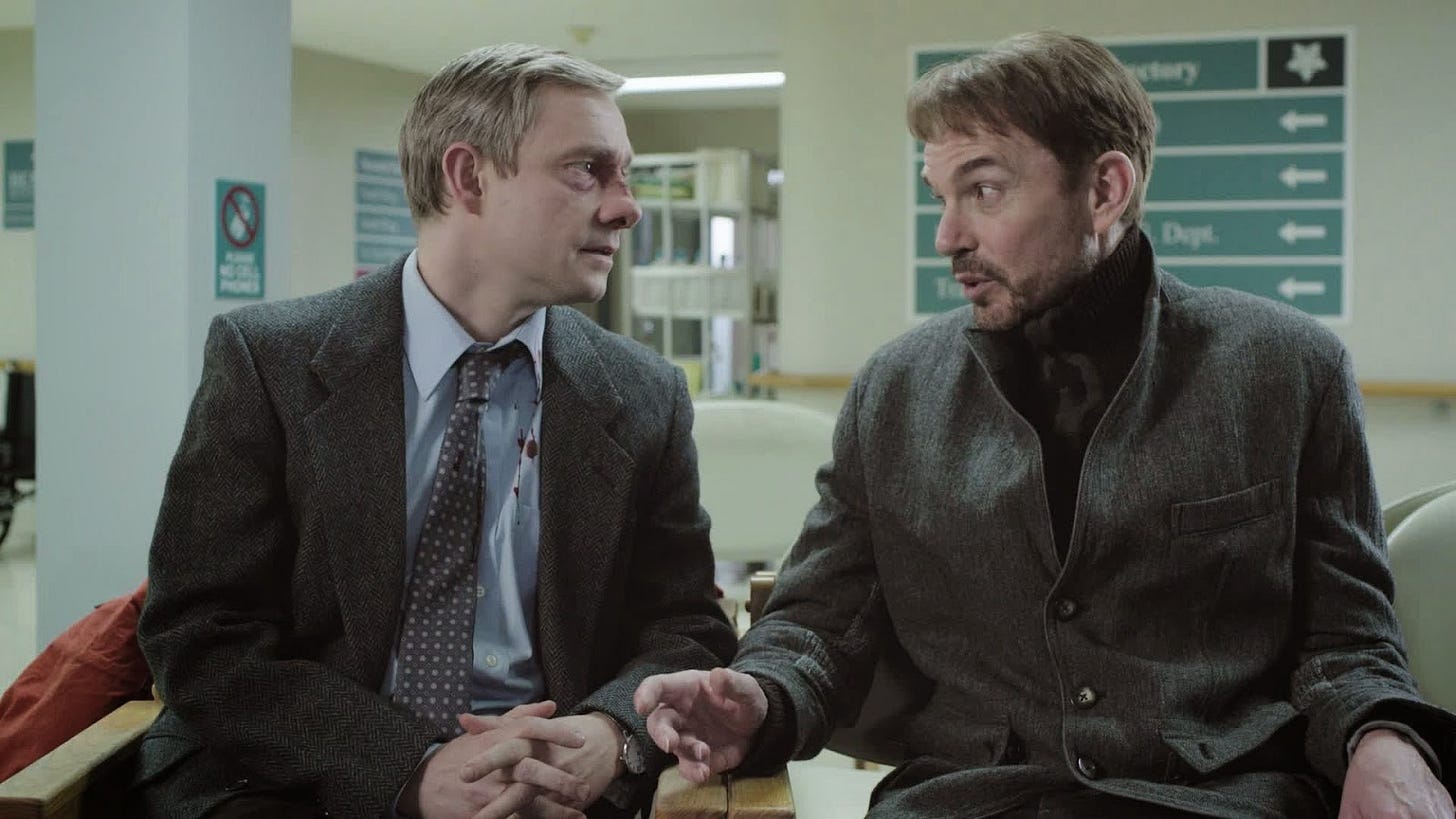
No corner of the series was more provocative, haunting, or intellectually rich than Lester’s arc, for if any human male (*) can honestly look at Lester’s actions, horrific and indefensible as they are, and not admit to feeling at least some amount of empathy for the character, one must be lying. Lester is the dark flipside of the American Dream writ large, the worst qualities of masculinity and male hypocrisy unleashed, but there is something universally primal about his actions that is impossible to deny. The great trick of the pilot, for me, is that it gets us firmly on Lester’s side early on, making us sympathize with him due to his cruel and emasculating wife, unfulfilling professional life, and torment at the hands of vicious high school bully Sam Hess. Most men can relate to some or all of that, I imagine, in principle or theme if not in literal truth, as those many sensations of emasculation are meant to nag at us in the patriarchal, power-driven society we live in today. Just as our sympathy for Lester seems to peak, he goes and overreacts wildly, brutally murdering his wife and inviting the death of Bemidji’s police chief, all while lying his ass off about all of it. He becomes a monster almost instantaneously, and yet, a certain level of empathy – not sympathy, but a feeling of understanding or relating – survives.
(*) I say ‘human male,’ and talk about Lester’s arc from a male perspective, both because I am a male viewer, and because I read this part of the show as fundamentally about masculinity and male emotions. Such an intensely gendered reading is open for debate, of course, and I myself am slightly uncomfortable with it (though ‘discomfort’ is, I think, a primary goal of Fargo). Do female viewers and critics have a different take on Lester’s actions, or is his story more universal than I am making it out to be? I do think gender is an essential consideration here, as Lester’s arc isn’t just about the inherent destructive qualities of masculine myths and perceptions, but also about misogyny and female-oriented violence, which is shown to be a primary effect of Lester’s unchecked male power fantasy. What terrifies me about Fargo is that I, as a man, can unwillingly feel empathy for Lester, even when I don’t logically want to, but does that have to do with me being male, and therefore feeling reluctantly in touch with the primal urges the show explores, or with me being human (in which case these urges defy gendered boundaries)? Does Lester’s story tap into a universal, non-gendered human capacity for violence and manipulation, or is it restricted to masculine perceptions? I suspect both answers are simultaneously correct, which is part of what makes this all so hauntingly complex.
And as the show progresses, and Lester finds himself on an upward trajectory, that empathy starts to crest as well, for there is an undeniable rush to seeing this man reclaim his masculinity, to dominate all who stand in his path, and I think those sensations are crucial to the experience of the show, at least from an American male perspective. Lester is simultaneously a figure we despise and someone we might aspire to be, were we to shut off our consciences and unleash our egos. Placed in a similar situation, we might do the same things, make the same power plays, destroy the same lives, because while the world of Fargo is obviously heightened, it is also familiar. Just like Lester, we live in a society that simultaneously represses emotions, ambitions, and individuality, while preaching certain destructive myths about masculinity, male dominance, and personal success or gratification. Lester is an object of immense, lifelong repression, who snaps with a force equal to the pressure bearing down on him, and while the results are extremely ugly and categorically reprehensible, they aren’t random or confusing. They are the product of what our society represses and what our society promotes, meeting at the middle in a point that reflects the true abhorrence of both sides.
Put in simpler, more broadly philosophical terms, there is an evil that exists within human nature and human civilization, and we all have it within ourselves to give ourselves over to that evil as a path to social dominance or ascension. That’s the theory Lorne Malvo is operating on in his interactions with Lester, and it’s why I make the devil analogy. Lorne does not kill Lester’s wife, nor does he destroy Lester’s family and frame Lester’s brother; Lester does all of that, and while Lorne pulls the trigger, Lester is the man primarily responsible for his second wife Linda’s death. Lorne just gives Lester a push, seizes upon and manipulates a scenario in which Lester is prone to burst, and lets the experiment run its course while he is out in Duluth dealing with Stavros. By the time Lorne encounters Lester again, the transformation is complete, so much so that when he poses the question directly to Lester – “Is this what you want?” – Lester answers a definitive “Yes,” willfully inviting the devastation that cascades upon him in the series’ final two episodes. The devil does not destroy Lester – the devil merely makes Lester aware of his own capacity for evil, and what that evil can do for him.
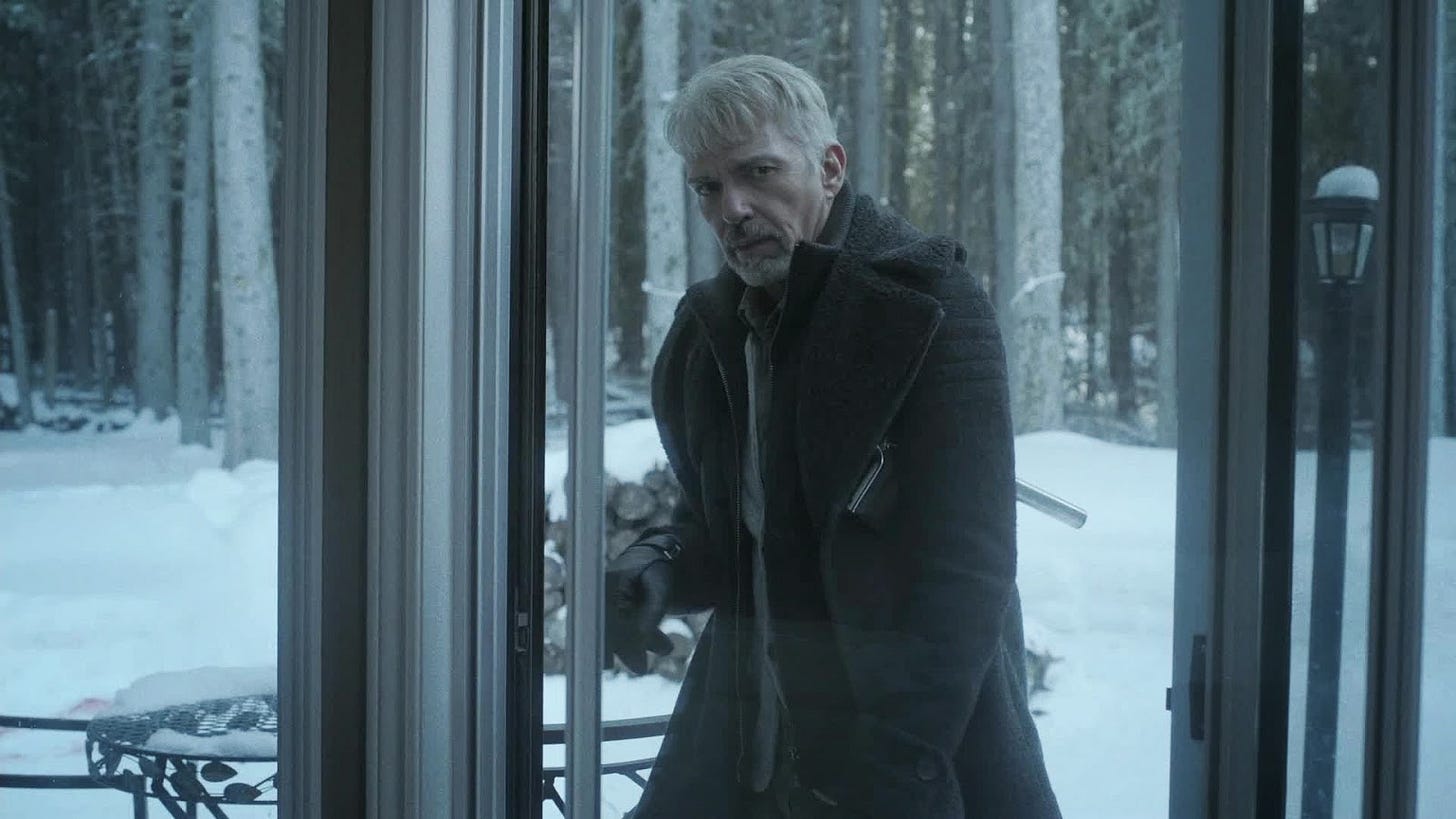
In this way, Lorne comes out of the series a ‘winner,’ even if he has suffered a physical death. Whether Lester gets away with it all scot-free, Lorne proved his theory in turning Lester so completely – if an everyman can become a monster, then every man has a monster inside him, so to speak – and he proves a separate but related argument when Gus kills him. There is, ultimately, no peaceful way for Lorne to be brought to justice, no civilized manner of eradicating the threat he represents, and given all Gus has seen over the course of the series involving Malvo – again in the fashion of the devil, Malvo destroys Gus’ career without laying a finger on him, so wholly successful is his intimidation of Gus in the pilot – it makes sense that Gus would, in the end, believe murder to be the only solution. And why shouldn’t he? Why risk more lives by trying to bring Malvo in quietly, in a situation he could, potentially, talk his way out of yet again? Why risk his family’s safety for the sake of morals or social codes? He feels he must turn to darkness if he is to protect the good, and while we can and should debate the ethics and functionality of Gus’ decision (that Agents Pepper and Budge die while Gus is waiting in Malvo’s house, without alerting the police, seems a deliberate decision meant to cast doubt on Gus’ actions), we cannot say we do not understand them. Thus, Malvo wins once more, pushing another man to embrace the darkness within and further proving the fundamental violence of human nature.
Malvo is, in this sense, an eternal figure, the evil he represents destined to survive and perpetuate long after his body has decayed. There are hints throughout the final episodes that Malvo is mystical or immortal, each of which can be read in narratively different but thematically identical ways. Malvo recognizes the violent spree Lou Solverson speaks of in episode 9, and while Malvo technically would have been alive at the time, him being the actual perpetrator strains credulity. And it is, of course, impossible that Malvo was in the Garden of Eden, as he jokes with Lou while eating Apple Pie. Both are literally untenable scenarios, but they make thematic sense; even if Lorne Malvo, in this body, was not a physical presence in the Garden, his actions, philosophy, and nature certainly were – original sin is the moment humanity gives into the temptation a devil figure like Malvo represents – and that same violent nature would, of course, recur in every horrific crime spree, whether Malvo himself was involved or not. I think one could reasonably read Fargo as a literal devil story, interpreting Malvo not to be a man but the actual fallen angel, or one can simply take Malvo as a devil figure, an embodiment of evil and its sly, tempting nature; both are valid interpretations, and both reach the same thematic conclusions: That whether one kills Lorne Malvo’s physical body or not, the substance of his being cannot die, an idea reinforced by the way his bullet-riddled body still appears alive and conscious after Gus puts two shots through his head.
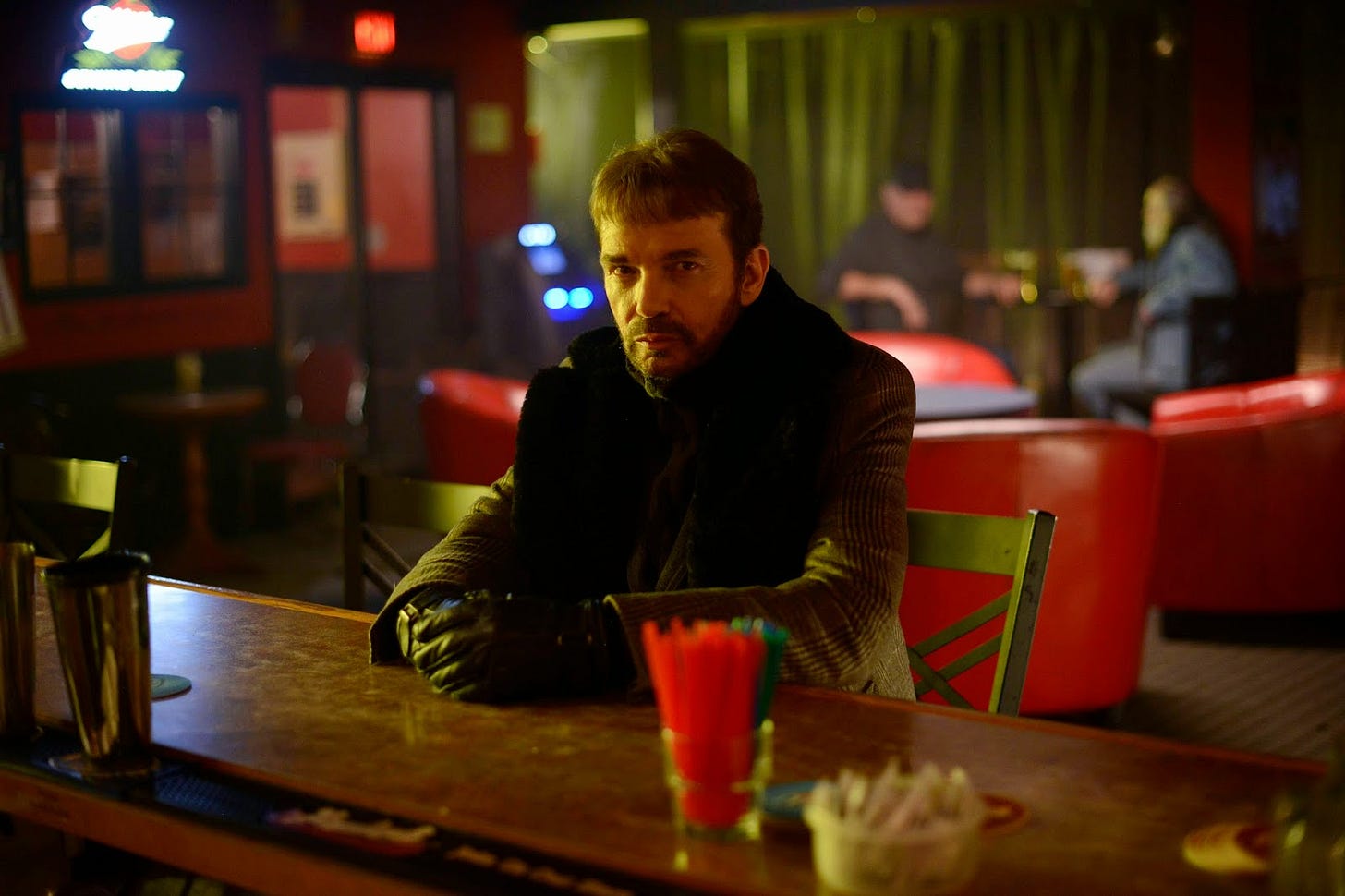
There is a ripple effect to the magnitude of these ideas, to the depths at which Fargo probes darkness and despair in its villainous characters (and in the violent actions its protagonists must take to stop them), and those ripples culminate in the series’ final scene. It is very similar to the end of the movie Fargo on the surface – Marge and her husband watching TV in bed, thankful to have each other after everything that has happened, versus Molly, Gus, and Greta sitting on the couch watching TV, happy to be together after all that has transpired – but the effect of the two scenes is very different to me. The film’s ending is this beautifully complex moment of simultaneous despair and catharsis, Marge pondering human darkness even as she feels thankful for her husband, and eager for the new life they are embarking on together. It hits the viewer like a ton of bricks because it is such an emotionally loaded moment, the sadness and ecstasy of the human condition all rolled up into one, and while the TV show’s ending is no less complex or rich, I find it much harder to grasp or internalize.
And that may be the point. Molly and Gus have carved out a good, fulfilling life for themselves, but one has become a murderer, and the other is destined to continue fighting the darkness day to day, a darkness that feels awfully enveloping and omnipresent by the time the series wraps up. I think the message is the same – that with family, and with a sense of perspective, humans can live above the worst of ourselves – but it’s messier here, harder to accept, demanding of greater thought and contemplation. It’s an intentional symptom of the finale itself, which denies much of the traditional ‘satisfaction’ we might be wanting at this point in the story. Molly doesn’t get to take down Malvo, nor does she get to put the cuffs on Lester, and when she gets the proof she’s been looking for in Malvo’s collection of recordings, it just makes her feel sad, not triumphant. The villains are taken down, but there is no absolution, no easy or emotionally fulfilling resolution, and that loads the final scene with a certain sense of contemplative melancholy. After everything we as an audience have been through watching this show, and after everything Molly and Gus have experienced, we can recognize the beauty of the moment – this family would not exist were it not for this investigation, after all – but can we ever do so without feeling a simultaneous twitch of fear, nerves, or guilt? All these emotions are baked in together, entwined and inseparable.
My feelings on Fargo as a series, of course, bear no such ambiguity. This was a fantastic show, wonderfully written by Hawley – who, amazingly, penned every single episode by himself – filled with great, vivid, and intensely memorable characters, and which consistently delivered tension and suspense as effectively as any story ever told in this medium (the ninth episode, in particular, is right up there for me with the most haunting episodes of Breaking Bad). It featured nothing but great, sometimes career-defining performances – Martin Freeman is one of my favorite actors of all time, and I think this is easily his best work to date, especially in these last few episodes – and it was a visual and stylistic knockout, each and every week (the movie obviously has a visual edge, but that the show came even remotely close to matching the visual poetry of Roger Deakins is a minor miracle in and of itself). It forged its own path, in conversation with but separate from the movie, even while it mastered that perfect blend of black comedy, shocking violence, and taut pacing that defines so much of the Coen Brothers’ work. It consistently entertained and challenged the viewer in equal measure, and felt a little unlike anything else in the entire entertainment landscape. Fargo was a masterpiece of a movie, and now it has been turned into truly masterful television. No one could have predicted it, but a nicer surprise is hard to imagine.

